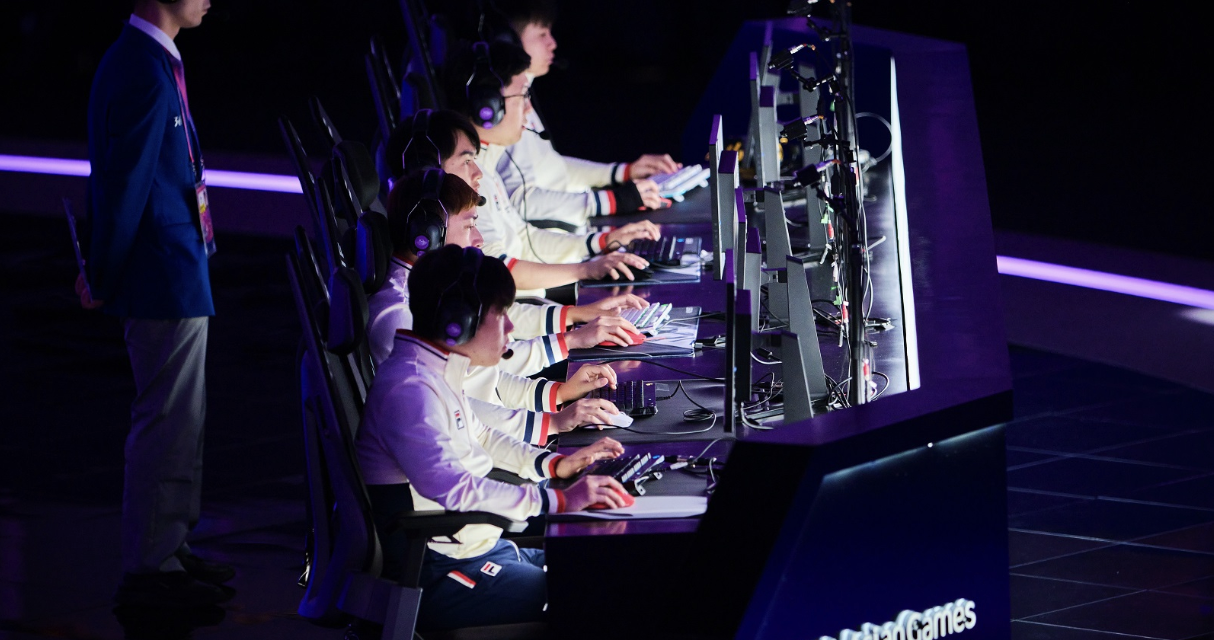By Yang Renkeer
HKU Journalism and Media Studies Centre
HONG KONG – With the final words of “defeated” appearing on the screen, Jazkit Chan, the captain of the Hong Kong team of Dream Three Kingdoms 2, put down his mouse and took a deep breath, ready to go down to the stage with his teammates for the award ceremony. His team had been defeated, but won the silver medal in the Hangzhou Asian Games e-sports competition in September.
At that moment, Chan said he thought of his late mother, grateful that she not only hadn’t objected to him pursuing his passion for e-sports, but also fully supported him.
“I would like nothing more than to give her this medal in person for raising me so well,” Chan told HKU Journalism.
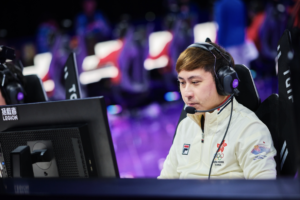
Jazkit Chan competing in the Dream Three Kingdom 2 video game competition in the 2023 Hangzhou Asian Games. Source: Sports Federation and Olympic Committee of Hong Kong, China
Dream Three Kingdoms 2 is a battle video game where players need to work with their teammates to defeat their opponents a certain number of times or push down the opponent’s base to win the game. And that was the last scene that took place on Sept. 30, 2023, in the final of the Hangzhou Asian Games e-sports competition.. On that day, Chan’s team, the Hong Kong team, was defeated by China’s national team by 0:2 and achieved the silver medal. This is the second e-sports medal won by the Hong Kong e-sports team in the Asian Games since they won gold in the 2018 Jakarta Asian Games ”Hearthstone” project.
E-sports, short for electronic sports, is a form of video game competition. E-sports often take the form of organized, multiplayer video game competitions, particularly between professional players, played individually or as teams.
In recent years, the global e-sports industry has been developing rapidly and has become a powerful vehicle for cultural export. According to data released by Newzoo, a leading video game data analytics firm, the number of players worldwide was forecast to reach 3.31 billion in 2023, growing 4.3% compared to the previous year. These include people who play video games on their mobile phones.
Over the years, Hong Kong has successfully exported unique cultural symbols through TV shows, movies, music, novels and comics. In 2017, for the first time, the Hong Kong government stated its intention to promote its e-sports industry. However, with black swan events such as Covid-19 pandemic as well as the 2019 Hong Kong mass protests, the development of Hong Kong’s e-sports industry has encountered difficulties.
Despite suffering some setbacks, however, as the mainland and Hong Kong’s e-sports industries continue to be closely connected, more and more opportunities arise and the future is promising.
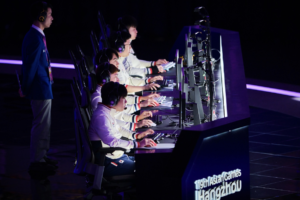
The Hong Kong team won a silver medal in the “Dream Three Kingdoms 2” event.
Source: Sports Federation and Olympic Committee of Hong Kong, China
A late start
Unlike Taiwan and South Korea, which have already converged with the international e-sports industry at the end of the last century, Hong Kong’s e-sports started relatively late.
“The earliest contact with the related industry was more than 20 years ago. Because I like computers, I was in the retail and wholesale business of assembled computers,” said Eddy Chen, president of the Esports Association of Hong Kong, sitting in his office. “One day a Taiwanese man suddenly came and ordered more than 100 computers. It was the first time I had ever seen such a big order. At that time, there might only be 20 or 30 computers in some big name companies. He told me those were bought for an internet café. That is my first contact with this concept.”
The internet cafe industry was an incubator for nurturing e-sports players in the early years. Many of the world’s talented e-sports players came from those grassroots internet cafes found on many streets . Some of the players came to prominence at a very young age through local tournaments organized by these cafes or communities.
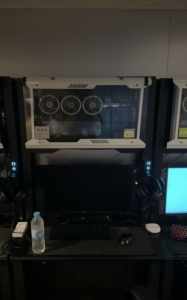
An internet cafe in Mongkok with dim lighting and poor devices. Photo by Yang Renkeer
For example, the undisputed kings of Counter Strike, the popular shooting game, are two cousins “Niko” and “Hunter,” who grew up indulging in the game in their family-run internet cafes. A player nicknamed “SKY,” China’s best Warcraft 3 player and a back-to-back World Cyber Games world champion in 2005 and 2006, trained for 6,000 hours in a small internet café because of the low cost of playing there.
So, more than two decades ago, after talking to the Taiwanese customer who had purchased hundreds of computers, Chen realized the business opportunities inherent in this industry. He started to do the internet cafe business in 2002 and opened his first cafe in Tsing Yi.
However, in traditional East Asian culture, being addicted to playing video games is seen as the same as giving up on one’s life. This caused a lot of problems for Chen’s internet cafe. At that time, parents and schools regarded his internet cafe as a game center. Even schools used to come to the internet cafe to catch their students.

In 2008, China’s official media praised a psychiatrist who used brutal electric shocks to treat “Internet-addicted” adolescents and adults. | Photo by CCTV news
Even though the family of Chan, the e-sports player, bought him a computer when he was very young, they would still object to him devoting too much time to playing video games.
Despite being disliked by the older generation, e-sports culture became more and more popular among the younger generation in Hong Kong. With the rise of CS, Warcraft, Starcraft and a host of other video games, Chen was surprised by the success of his first cafe, which had already made a return on its investment in just the first three to four months it was in business. And then his internet cafes expanded rapidly to four outlets in the following two years. Chen also regularly organized video game tournaments to attract customers. Even some international tournaments would invite his brand to take care of the Hong Kong leg of the tournament.
During that period, many top players in Hong Kong chose to look for opportunities from the mainland as they did not want to be limited by the small local market. Former League of Legends pros such as Tabe, Whitezz, AmazingJ, and many more players familiar with the mainland e-sports audiences are actually from Hong Kong.
With the gradual popularity of e-sports culture around the world, the concept of “e-sports” gradually gained more rational scrutiny in Hong Kong’s society, and many people’s attitudes towards e-sports have gradually shifted. E-sports gained wider acceptance in Hong Kong in the late 2010s. A questionnaire released by Hong Kong Internet Registration Corporation Limited and Hong Kong Baptist University in 2017 showed that 53.9% of respondents approved of professional e-sports competitors using competitions as their main source of income.
Painful and difficult transformation
Riding on the wave of the Internet, video games such as League of Legends have brought a new dawn to e-sports. In 2002, few people would have thought that the market behind just one type of video game could reach tens of billions of Hong Kong dollars. According to industry research firm LeadLeo, from 2014 to 2018, the market size of China’s MOBA game industry grew from 11.56 billion yuan (about 12.5 billion HKD) to 28.16 billion yuan (about 30.4 billion HKD), with a compound annual growth rate of 24.9%.
The Hong Kong government started to worry about falling behind in the e-sports industry. In order to change the status of the lack of local talents and small market size, in the 2017 budget prepared and delivered by Hong Kong’s financial secretary, e-sports was characterized as a new area with potential for economic development, and it was the first time that the Hong Kong government explicitly stated its intention to industrialize e-sports.
Chen, the internet cafe owner, said that when the 2018 Jakarta Asian Games was held, many local Hong Kong TV stations didn’t even plan to get the broadcasting rights for the e-sports competitions because they were unfamiliar with the popularity of e-sports and this was the first time that an e-sports program had entered a major event like the Asian Games. Yet to the surprise of all the TV stations, including the organizers, the online attention gained by e-sports surpassed the sum of all the remaining traditional programs.
Such a huge base of global audience naturally makes Hong Kong the center of cultural exchange between China and the West, which gave it the ambition to develop a corresponding prosperous e-sports industry. However, seven years on, the number of internet cafes in Hong Kong has fallen from more than 700 in its heyday to just over a dozen today. Cyber Games Arena, Asia’s largest integrated e-sports stadium, closed in 2023 due to the Covid-19 pandemic. Some other internet cafes have been criticized for hygiene issues and service problems, with others even requiring customers to wait in their seats for hours to download a game they want to play.

In Google Maps Hong Kong search results for internet cafe in 2024, the vast majority of them are amusement arcade rather than internet cafe | | Photo by Yang Renkeer
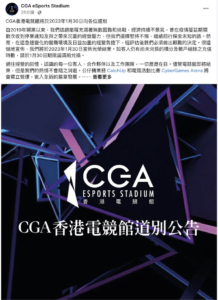
CGA Issues announcement to close its major operations in January, 2023
Internet cafes are just one part of the problems Hong Kong’s e-sports industry faces. Hong Kong e-sports teams also struggle to get commercial sponsors because they performed poorly compared to mainland teams.
“Sports sponsorship is very simple, companies only look at achievements and influence,” said Riconi You, who has worked for HSBC in Hong Kong for 11 years and whose blockchain company FINWEX was a sponsor of JDG, a famous e-sports club in the mainland. “Compared to Hong Kong, mainland teams have more sponsorship potential for me for gaining more audiences, their good performance and high commercial value. “
Bright future
The synergistic development of the e-sports industry in the Greater Bay Area, however, has received strong official support. According to CCTV news, in the past few years, associations in Guangdong, Hong Kong and Macao have carried out a lot of cooperation, such as signing a framework agreement with AESF (Asian Electronic Sports Federation) to jointly promote the development of e-sports and exchanges in the GBA. With its own internationalization, the vast market and financial power of the mainland, Hong Kong’s e-sports industry is in a period of potential growth
Dr. Kevin Wang, a lecturer from the department of computer science of Hong Kong Baptist University (HKBU), has offered a University Core Healthy Lifestyle lecture on the theme of e-sports this semester. In this course, which is called E-sports and Health, students are exposed to a variety of video games in each class. They train memory, concentration, or other physical qualities by teaming up against each other. The scores from these confrontations are even credited to the students’ final grade. This course has been widely praised by students.
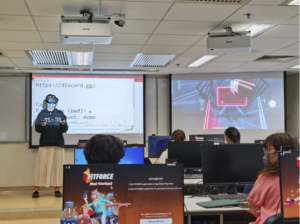
Students having E-sports and Health course in HKBU| Photo by RED user @731734361
Usually such courses are sports classes like badminton, tai chi meditations and similar activities.
“We believe that if you do it in the right way, playing video games can also bring healthy values to students and promote a better lifestyle,” said Wang. “But the development of e-sports in Hong Kong is rather fresh, we will try to do some more activities through e-sports.”
In addition to this course, some universities also offer e-sports-related degrees. For example, the Hong Kong Metropolitan University set up a degree called Bachelor of Business Administration with Honours in Sports and eSports Management. This degree is subsidized by the government, with eligible local students able to receive up to HK$34,390 of assistance in the 2024/25 academic year.

Program page | Photo by Hong Kong Metropolitan University’s Official Website
Meanwhile, the Global Sources Exhibition, an electronics sales exhibition held annually in Hong Kong, was crowded with visitors this year. There was a new gaming show area, with e-sports teams cheering on site, and a full parade of e-sports models. Jackson Liang, a staff member at Global Sources said that this year’s foot traffic has increased by 10 percent, and there are also many new exhibitors and products.
“The global demand for e-sports accessory products such as gamepads, computer accessories, and VR glasses is continuously on the rise,” said Liang. “Hong Kong can radiate the global market compared to Southeast Asian cities such as Jakarta.”
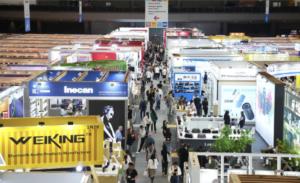
This year’s exhibition is more crowded. | Courtesy: Jackson Liang
More signs came from the cooperation between mainland teams and the Esports Association of Hong Kong. According to ESAHK, “All Gamers,” a Glory of Kings club from Chengdu, China, is working with the association on the advancement of an overseas branch. The team, which won the global championship in the sport last year, is considering making inroads into the global market.
Chan, the e-sports player whose team won a silver medal in the recent Asian Games, intends to continue his e-sports career in Hong Kong.
“I think it is good for Hong Kong to communicate and develop with other regions and countries,” said Chan. “After all, their systems are much larger and more mature than Hong Kong’s, which will bring more development opportunities.”
Advisor: Cezary Podkul

